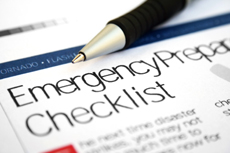
How to prepare for natural disasters is the stuff they teach in Crisis Communications 101. But many of us took that course ages ago.
As PR pros, some of us even teach it. And we’re apt to forget it when bad news happens to us.
What better time than now for a refresher—just after an earthquake hit this week near Washington, D.C., and the Eastern Seaboard of the United States is bracing this weekend for Hurricane Irene and its life-threatening waves and winds?

“That’s because most people panic when something bad happens,” he said. “If you think clearly, you can probably solve the problem.”
Safety First
Most important is making sure you’re safe, he said. That includes heeding calls to evacuate, and doing it early enough so that you have time to leave the area that’s in danger. If you’re in a large metropolitan area like New York City, know what to do and review your city’s Hurricane Evacuation Plan.
“Make sure that you’ve brought enough food, water and ice,” Lewinter said.
Employees Next
“Know the phone numbers of all of your employees, and keep them in a safe, secure offsite location,” he said.
The list should include their home addresses, home phone numbers, email addresses and a friend or relatives to call in case of an emergency.
If you won’t be able to return to your office for days, or even weeks, how will your employees be paid? Have a contingency plan for payroll.
How will you communicate with them during the disaster? Create procedures for keeping them informed.
“Remember that you’ll have to make sure your cell phones are fully charged,” he said. “You can charge them in your car if you have a battery charger, or you can charge them from the USB port on your computer.”
Have support systems, such as counselors, in place just in case employees may need them.
Have an Emergency Plan
“If you can’t operate from your office because of a power outage, or flooding, or whatever the damage happens to be, you’ll need to retrieve all your data. Back it up daily—not just on site but also to a secure location off-site.”
What if you’ve backed up your data offsite, but your office building was demolished during an earthquake, or it was so severely damaged by a hurricane that it will take months to repair?
Have a contingency plan. Call your insurance agent and ask if you’re fully protected under your current policy. Do you have enough insurance protection? Does your policy cover earthquake damage? Some policies don’t.
Is there another office building you can use temporarily? How much would it cost to relocate your business, or even to suspend it temporarily? Seek multiple opinions from the experts so you can make the right decision.
Do you lease your office, or the building? If so, you must know what the lease agreement says about emergencies and who is responsible for what, Lewinter cautions.
Confused about something in the lease? Make sure you understand anything that’s vague. If necessary, get it in writing.
If your building is still intact, but you’re without Internet or telephone service, have a contingency plan for that, too. Should your business have its own backup generator to produce electric power? Make that decision BEFORE a disaster, not after.
Take Care of Your Customers
Keep a current list of customers and all contact information—again, at an off-site location.
“After a disaster, call or email them and let them know what’s happening,” Lewinter said. “Be as accommodating as possible so that they can continue to do business with you once your business has returned to normal.”
And don’t forget your vendors such as freelance writers and photographers, artists, printers, and even ad agencies.
Take an Inventory of What You Have
Lewinter loves lists because they’re stress-reducers in times of emergency and they help you to think first, panic later.
“Create a list of equipment and services you need to run your business such as computers and furniture,” he said. “Your insurance agent may ask for it. Your banker might, too, if you need to borrow money. This list will also give you an idea of what it will cost to keep the business going until normal business resumes. ”
Take photographs for insurance purposes.
Have contact information for utilities, all services you outsource, and emergency numbers you may need, like your insurance company.
Keep a list of current PR projects and delivery dates.
Copy all important business papers and keep them in a fireproof filing cabinet, or offsite. During a hurricane, important papers should be stored in an airtight, zip-lock bag, even if you’re taking them with you when you’re evacuating.
If You Don’t Have Time for All This
Many of the items on this list can take weeks to accomplish.
If the hurricane is just a few days or hours away, where do you start? At the top of the list.
Also see Ben Silverman’s excellent Disaster Preparation Tips for PR Firms. It’s as beneficial today as it was when he wrote it more than two years ago.
My Own Tips
Use your company blog as your main communication tool. Most PR firms probably blog, but I’ll bet some sole practitioners don’t. If you’re not blogging yet, you should be. See Time-saving Tips for Smart Business Blogging.
Make maximum use of all your social media sites. Keep your connections informed on LinkedIn and use the Q&A feature when you need help. People will come to the rescue. You can also seek help by asking questions on Quora.
Use Twitter to communicate with your followers, vendors, employees and customers. Use hash tags to make it easy for people to find updates about how the company is doing. Don’t forget Google+.
Post photos to sites like your Facebook page and Flickr account.
As you rebuild and get back on your feet, consider documenting your progess via videos and uploading them to YouTube.
And, finally, don’t forget to publicize your own story! You have loads of journalist contacts and you know how to pitch the media. Use them.
Write letters to the editor and op-eds, if appropriate. Comment at other blogs, too.
Those are our tips. Now what about yours?
What have you done to minimize the risk to your own company from a natural disaster, regardless of whether you specialize in PR? What tips can you add to this long list?
Wow, what a great post. I really liked how the author stressed the importance of safety. There’s actually a great webinar online that discusses emergency preparedness in depth. It is really useful for businesses to ensure the safety of their workers and protect against citations.
Check it out:
http://www.provpubs.com/webinars/webinar-emergencypreparedness/